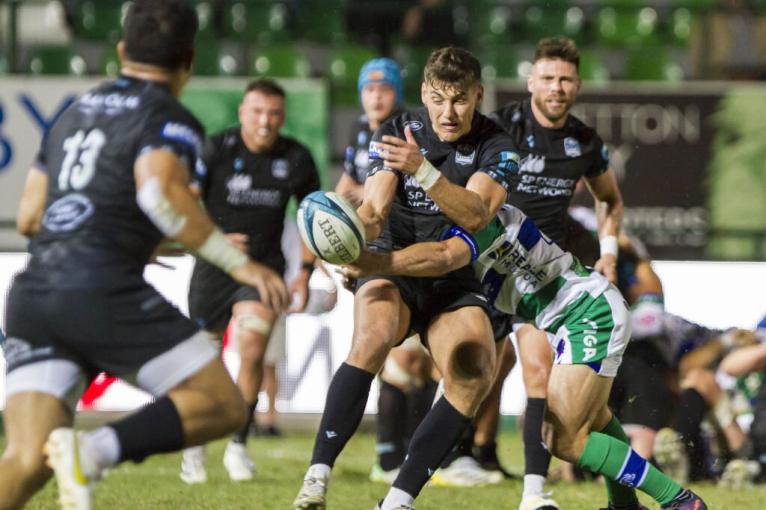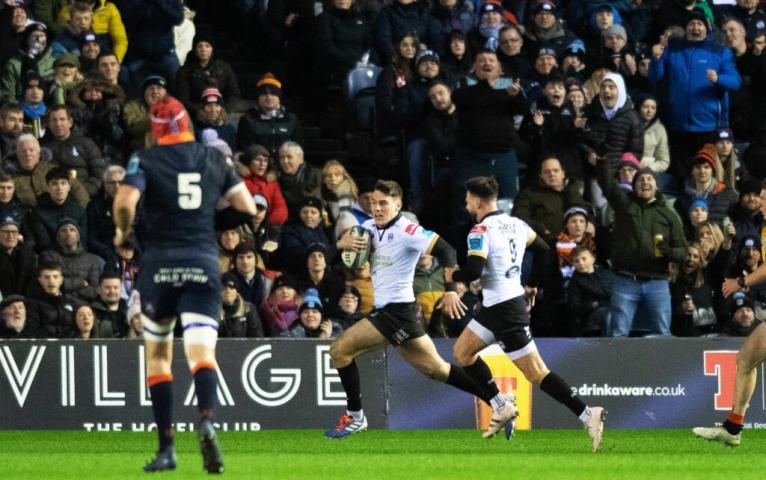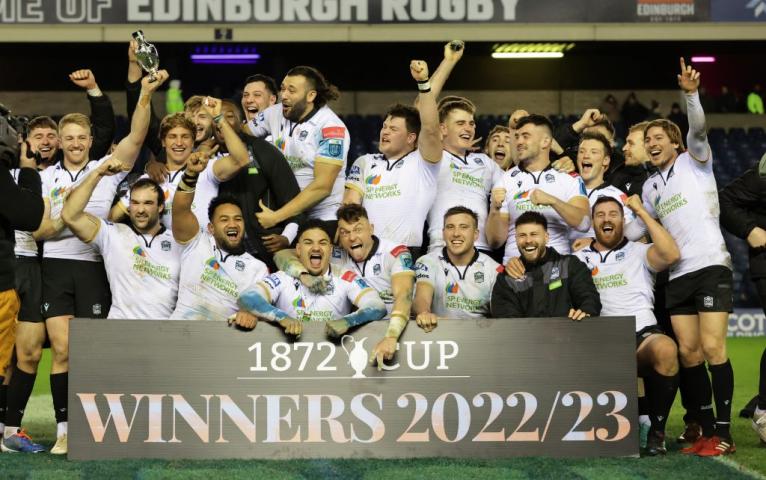There have been times during his three-year, pandemic-ravaged stint in Scotland that Tom Jordan has wondered what on earth he signed up for. Why he swapped home and familiarity and a shot at New Zealand’s provincial showpiece for hours of fruitless training sessions and no hint of elite-level action.
Jordan pitched up at Ayrshire Bulls in October 2019, freshly furnished with a degree in finance and accounting, and out of the professional set-up at the Waikato union. He figured broadening his horizons was a better bet than moving back to the family house north of Auckland and that five months of semi-professional Scottish rugby would sharpen his wits and his skills as a burgeoning 21-year-old fly-half. He had no Scottish heritage but a UK passport thanks to his English grandmother. He might end up bagging a lower-league contract in London and a nice job in the city to go with it. If he didn’t, he could go back to New Zealand just in time for the new season to start.
Five months have become 39. Coronavirus took a sledgehammer to the sport. Deals elsewhere were non-existent. Glasgow called Jordan in to train for a closer look at his skills, but there was no sniff of game time. In early 2021, with Warriors competing in the Rainbow Cup, Jordan felt hopelessly stuck. All he could do was keep pushing, keep grinding, keep showing up.
“Even Nat One clubs in England were like, ‘nah’. I was thinking, ‘am I even good enough?’.”
“I hadn’t been offered anything, I was just at Glasgow on a little training retainer, enough to get by,” he tells RugbyPass. “I’m over here chipping away but where’s this going? What am I doing?
“I was trying to look everywhere to get a gig. Nothing was coming up. Even Nat One clubs in England were like, ‘nah’. I was thinking, ‘am I even good enough?’.
“At the time, Glasgow had Adam Hastings, Brandon Thomson, Ross Thompson and a few academy 10s, and five or six midfielders. Are ten guys going to get injured for me to have a go? It was not looking positive. With covid, nothing was going on. I just felt a bit lost, you know?”
If Jordan was lost back then, he has emphatically found his way now. He steered the Bulls to the Super6 title later that year, and Glasgow signed him up for the rest of the season. Since Franco Smith took charge in the summer, Jordan has been the South African’s go-to man in the 10 jersey. He has climbed so far above the National One clubs who turned him down that they can’t see the studs on the soles of his boots.

His rise has taken longer than he hoped. In New Zealand, he was part of the Waikato academy while winning two club titles with the Hamilton Old Boys alongside several future All Blacks. He trained with the Chiefs Super Rugby group and played a handful of development squad fixtures. That felt like sharing the field with demigods. Still, he could not make the grade for the famous National Provincial Championship. Through a friend of a friend, Ayr provided an intriguing ticket to something fresh.
“I would train with the NPC squad but never quite cracked a game,” Jordan says. “It just didn’t happen for me. After three years in the academy, I had an offer to go back home to North Harbour but I wanted to finish my studies and move on.
“A lot of people in New Zealand don’t really know what rugby opportunities are out here. A mate of mine knew Lars Morris, a second-row from Bay of Plenty. He had gone to Ayr for a few years and told me they were starting up a semi-professional team. Lars knew Peter Murchie, who was coaching them at the time, and told him I was keen to come over.
“I don’t know what was the final straw for me going, I just wanted to travel and go off on my own. I wanted to keep exploring and doing stuff. I just didn’t want to go back and go to work. I wanted to keep pushing that boat out.”
My first goal for this year was just to play one game. I didn’t know when it was going to be, I just wanted to play one game and I was going to work my arse off, do anything to achieve that.
In two seasons with the Bulls, Jordan shone. The first campaign was curtailed by covid at the knockout stage, but in the second, he was their playmaker-in-chief, and man of the match in the final victory over Southern Knights. The Super6 was designed to bridge the gap between clubland and the URC, and there are opportunities to blood emerging talent against hardened senior specimens.
“When I started at Hamilton Old Boys, the other fly-half was 36 so literally double my age,” Jordan says. “It’s different here, a lot of the young guys are in the academies and not really club players through and through. They are academy players who get released.
“The young boys haven’t experienced that club rugby culture or men’s rugby. Even at Ayr when we had the academy players come down, they just hadn’t experienced bus trips away, that real club footy stuff. That was eye-opening.”

Jordan had no idea what this season might hold. A professional debut would have sated him. He could never have envisaged starting nine of the opening 10 URC matches, of being given the nod for Smith’s first match as head coach, a wounding curtain-raiser at Benetton. There have been trips to Parma, Durban and Dublin. To cap an intoxicating four months, he ran out in front of 25,000 at Murrayfield last Friday in the 1872 Cup decider, by far the biggest crowd he has ever played in front of.
In this swirling bowl of fire and fury, Jordan thrived. He ran in his first Glasgow try and sat Scotland centre Mark Bennett on his rump with a fend strong enough to puncture chainmail. The Warriors scalped Edinburgh for the second week running and claimed back the trophy. Though it will take two more years of residency for Jordan to become Scottish-qualified, those running the national set-up will be heartened by his progress.
“It’s pretty cool, the difference from a year ago to now,” Jordan says. “I would have been playing the Super6 final then. You just want to go again. It’s hard to find that experience elsewhere, in day-to-day stuff.
“My first goal for this year was just to play one game. I didn’t know when it was going to be, I just wanted to play one game and I was going to work my arse off, do anything to achieve that. To keep playing and be involved each week, I’m really grateful and keen to keep building. I know I can improve on a lot of areas.
“I thought at this level it was going to be a huge step up but it was a lot closer than I expected. You realise you can compete with these guys and take more responsibility.”
It dawns on Jordan that he hasn’t paused to take all of this in, that he is actually living the dream he felt slipping through his fingers doing endless yoyo runs with an even more endless list of fly-halves ahead of him.
Like Franco says, you don’t need to lose to get better: keep winning, keep improving. We win on the weekends and we still get grilled on Monday for things we could do better.
“You go through those real battler days when you’re getting on a bit – still young at 23 or 24, but a lot of people crack it when they’re 19, 20, 21. I’d been here a while and it still hadn’t happened. It just made me more ready.
“When I was younger back in Waikato, I probably thought I was ready but I wasn’t. I might have played three games in the NPC and then been told I needed to work on a few things, dropped off, and not reached my full potential.
“I’ve managed to be in the professional environment with Glasgow for over a year, build up all these skills, and when I got my opportunity I wasn’t that nervous, I was like, ‘yes, this is the right time, I’ve put in two or three more years than I thought I would to get here but I feel way more ready now’.”
The champion Stormers arrive at Scotstoun on Sunday with Springboks in tow and Glasgow’s five-match winning run in their sights. Jordan starts at 10. Another dizzying experience. Another mighty foe. Another chance for Glasgow to burnish their play-off credentials.

“We’re getting really solid in all points,” he says. “Our defence has taken a lot of steps forward from the start of the season. We back our defence and we know we can get turnovers within three or four phases.
“Like Franco says, you don’t need to lose to get better: keep winning, keep improving. We win on the weekends and we still get grilled on Monday for things we could do better. We know there is so much more all of us can do. Going up against the top teams when they’re fully stacked, we need to be peaking.”
Jordan’s ascent was slow and painful, then suddenly giddying. The peak? Who knows where that might come.


Tom is a really good player for Glasgow Warriors. Keep up the good work!